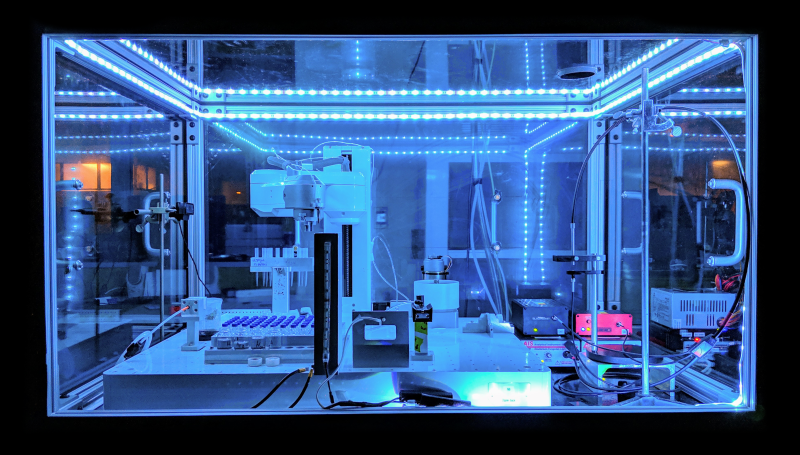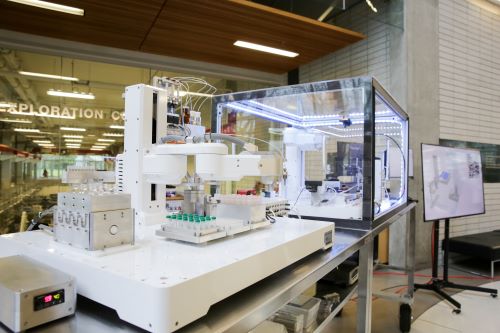News
Accelerating materials research with flexible automation and AI

A paper published today (May 13, 2020) in Science Advances (https://advances.sciencemag.org/content/6/20/eaaz8867)
presents Ada, the world’s first artificially-intelligent self-driving laboratory for the discovery of thin-film
materials.
Project Ada is an initiative led by researchers at the University of British Columbia and the University of
Toronto that combines machine learning with automation to accelerate the discovery and optimization of
advanced clean energy materials. This fundamentally different approach offers the opportunity to deploy
renewable energy technologies faster than ever before.
Materials discovery is a key element of the innovation cycle for the development of new technologies,
particularly in the clean energy sector. However, discovering effective materials among a vast array of
conceivable formulations can take decades using conventional approaches. The slow pace is costly,
time-consuming, and inadequately addresses society’s urgent need for clean energy solutions.
Project Ada aims to alleviate this bottleneck by developing self-driving laboratories that combine materials
science with flexible automation and machine learning. The Ada platform is equipped with capabilities to
run an experiment, evaluate the result, and utilize this information to plan and execute subsequent
experiments. Each automated round is guided by machine learning algorithms to maximize efficiency and
accelerate innovation.
This approach was championed in a 2018 Mission Innovation (MI) expert report, and the Project Ada team
is the first group globally to answer MI’s call to action and create a self-driving laboratory for thin-film
materials research that is automated, autonomous, and adaptable for a variety of materials systems.
The inaugural Ada demonstration reported in Science Advances explores new material formulations for
advanced solar cells. Footage of Ada in action can be viewed here. Ada has been built from the ground up
to be highly modular, enabling the platform to be readily customized to tackle nearly any problem in
materials science (both within the clean energy sector and beyond).
The work in this publication was supported by an $8M, 3-year grant from Natural Resources Canada. The
interdisciplinary Ada team has partnered with North Robotics, a Canadian small business that specializes
in robotics for laboratory automation, and is also engaging with industrial and academic collaborators
around the world to further develop Ada’s core systems and maximize the platform’s impact.

Team Background:
The Berlinguette Group, University of British Columbia
Professor Berlinguette leads a large interdisciplinary team that explores, discovers, and deploys advanced
materials that serve an ever-growing need for high-performance, low-cost alternative energy technologies.
The Berlinguette Group specializes in systems that can convert abundant feedstocks such as sunlight,
water, and CO2 into fuels and products of value.
The Hein Group, University of British Columbia
Professor Hein’s research program develops intelligent robotic systems that can solve complex chemical
problems autonomously. The Hein Group integrates modular robotics with analytical hardware to facilitate
automated reaction profiling, thereby advancing process chemistry, pharmaceutical development, and
chemical manufacturing.
The Aspuru-Guzik Group, University of Toronto
Professor Aspuru-Guzik’s research group develops artificial intelligence and machine learning methods for
materials discovery and optimization as well as quantum computer algorithms for applications in the
physical sciences.
Additional Links:
● www.projectada.ca
● Natural Resources Canada’s Project Ada webpage
● Natural Resources Canada press release, Canada Invests in First-of-its-Kind Robotic Platform at
University of British Columbia
● Footage of Natural Resources Canada’s funding announcement
● Science News, AIs direct search for materials breakthroughs
● World Economic Forum article, How AI is Revolutionizing the World of Clean Energy Materials
Article content and images provided by the Hein Lab
May 13, 2020 | For more information, contact abrown@chem.ubc.ca